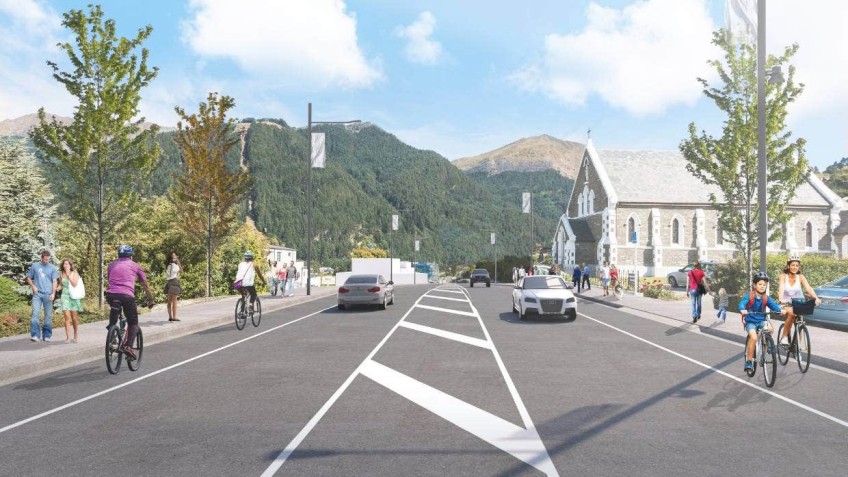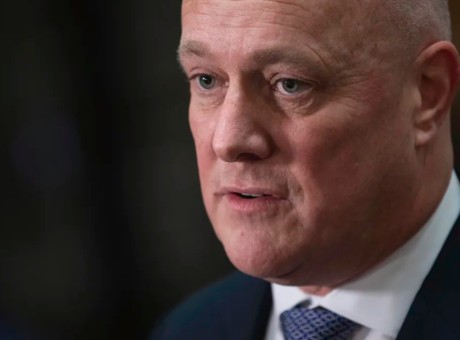Bypass blowout: QLDC approves extra $18m

An unfinished roading project was not an option for Queenstown Lakes District councillors, who today approved an extra $17.65 million to keep work happening on Queenstown's problem-plagued arterial road.
The overall budget for stage one of the bypass route, designed to deal to traffic congestion in the CBD, has now passed $128 million.
Ratepayers will need to service the additional debt, with a council boss indicating accommodation and commercial properties will bare the brunt of the unexpected bill, including larger, higher-end hotels that could see an up-to $6,400 jump in annual rates for the next three decades to cover it.
In a discussion prior to the vote at today's full council meeting, councillor Melissa White summed up the sentiment for many around the decision-making table when she called it "a hard pill to swallow".
Project staff warned that choosing not to approve the extra spend would mean an uncompleted roading project in the "heart of town" and the risk of "reputational harm".
Also at risk, $50 million of central government funding towards what was pegged as a shovel-ready project.
Councillor Niki Gladding was the sole voice opposing the spend request, arguing instead that consideration be given to dropping the existing project partnership.
The project is being delivered by Kā Huanui a Tāhuna (the Whakatipu Transport Programme Alliance) comprising the QLDC, the New Zealand Transport Agency, Beca, Downer, Fulton Hogan and WSP.
Councillor Gladding has concerns about the number of "expensive people" at the top managing the works and asked what savings could be made by cutting ties.
Project staff confirmed 40 to 60 management level positions were still actively overseeing the project, but ditching the arrangement carried too much risk, in their opinion.
Councillor Lisa Guy worried that pushing pause at this point would result in qualified workers needed to see the project through drifting away.
It is the second significant budget blowout for the road upgrade - in April last year the council approved a $20.6 million increase - and it was obvious many of the councillors resented being put in the situation again.
"We found ourselves here last year, we're here now, and we might find ourselves here again in the future," councillor Esther Whitehead said prior to casting her vote.
"It's a really terrible position to be put in again."
Council staff have indicated there is no guarantee that today's agreed budget boost will be the last.
However they did offer some assurances, saying there are only six to eight weeks left of underground work, which has bigger potential for unknown challenges to arise.
One of the biggest risks: stretching out the job, the say. There is a window of weather for getting roadworks done and missing deadlines will push up bottom lines.
Deputy mayor Quentin Smith acknowledged councillors were "in a bit of a bind here".
"This project can not go unfinished, but I really can't reconcile the cost we're responsible for versus the lack of control we've had on this project."
It is his view, "Partnerships and collective agreements, where we don't have control but we have financial risk, can't continue".
He asked for, and received, confirmation from staff Wānaka-Upper Clutha ratepayers would not be shouldering today's agreed-to top-up.
Councillor Gavin Bartlett, an engineer, raised concerns about the hands-off approach councillors.
He claims a lack of communication between councillors and the Alliance board, on a project that impacts significantly on, and brings risk to, the community. "That's surprised me."
Councillor Lyal Cocks expressed his desire to "get this darned project finished", saying it wouldn't be right to push the problem out and onto a future council.
He thinks it needs to stop being called a "shovel-ready project".
"In hindsight, it wasn't really shovel ready."
Councillor Craig Ferguson was absent from the meeting, however Mayor Glyn Lewers read a statement on his behalf, written after meeting with local residents and businesses impacted by the prolonged works.
"The stress has been immense," he said.
He spoke of properties "behind the cage for two years", and managers and others nearly in tears as they told him of their experiences that included hotel guests moving out in the middle of the night, a lack of communication, and distress at seemingly never-ending noise and vibrations from earthworks.
"I found it very confronting," he said.
With the extra funding now approved, stage one of the arterial road is schedule to open in December, although some further works to fully complete the site will be needed in the first months of next year.
The first stage will link Frankton and Gorge Roads via Melbourne and Henry Streets.
First price indications in the council's 2021 to 2031 Long Term Plan were close to $50 million, but by the time an agreement was reached with the Alliance that same year, costs to complete had already ballooned to more than $70 million.
At today's meeting council finance boss Stewart Burns said the latest budget approval will see an overall one percent impact on rates, which will fall on Wakatipu ratepayers, and the majority of it on commercial and accommodation properties.
He said in dollar terms, median value residential properties can expect to pay $18 to $31 more over 30 years, and median value commercial and accommodation properties $160 to $256.
Meanwhile for higher value residential properties the rates increase will be up to $112, for higher value commercial properties up to $2,000, and for higher value accommodation properties up to $6,400, he said.
The information was provided in response to a question from Councillor Gladding.
In a statement earlier this week, council chief executive Mike Theelen blamed the ratcheting costs on an "incredibly complex" construction project, "against a backdrop of escalating costs affecting the entire construction industry".
Main image (QLDC): A concept design for a finished Melbourne Street, part of a new bypass road for Queenstown.


























